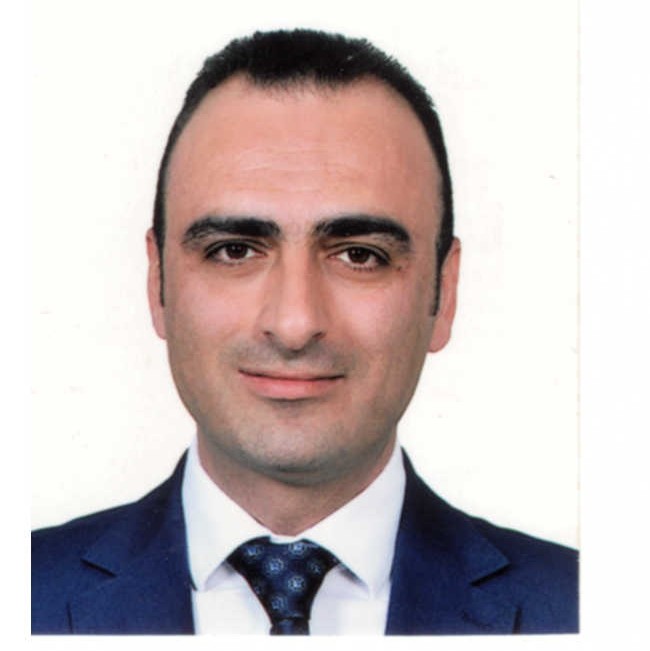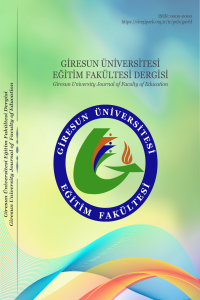Research Article
Aim & Scope
Giresun University Journal of Faculty of Education is an international peer-reviewed journal and was established to reveal "studies in the field of education". In this regard, it is aimed to contribute to the solution of educational problems through qualified scientific studies.
In this context, the aims of Giresun University Journal of Faculty of Education are;
• To publish research on issues of national and international importance in the field of education,
• To publish high quality articles of national and international importance in terms of research design and/or findings,
• Establishing a communication network between national and international researchers,
• To provide a platform for scientific studies in the fields of education, training and learning to reach large audiences.
The Giresun University Journal of Faculty of Education welcomes studies encompassing theoretical, experimental, meta-analysis, and review articles pertaining to education. Studies conducted within the realm of education are published in the Giresun University Journal of Faculty of Education in either Turkish or English. The target audience of the journal encompasses researchers, teachers, teacher candidates, informaticians, students, as well as individuals and organizations producing products and services for the education sector, who are actively engaged in fields such as Mathematics and Science Education, Turkish and Social Sciences Education, Psychological Counseling and Guidance Education, Elementary Education, Computer and Instructional Technologies, Foreign language Education, and Fine Arts Education under the umbrella of education scientists. The Giresun University Journal of Faculty of Education operates as an open-access and double-blind peer-reviewed journal. Submitted articles undergo evaluation by at least two referees to assess their alignment with the journal's purpose, focus, and scope. Based on the evaluation results provided by referees and the section editor, the articles are either rejected or accepted for publication. Should at least two referees and section editor express positive feedback, authors are instructed to incorporate necessary revisions in accordance with the received feedbacks. Upon completion of required revisions by the authors, articles are re-evaluated to ensure compliance with writing rules before being communicated with the authors for publication in their final form.
Author Guidelines
The submissions to Giresun University Journal of Faculty of Education must adhere to the following conditions listed below. Works that do not meet these conditions will be returned to the authors.
Submitted works must not have been previously published or submitted for evaluation to another journal.
Works submitted to the journal must be in Microsoft Word format.
For works submitted in Turkish to the journal, an Extended English Abstract is required.
***Authors should submit the English extended abstracts of Turkish works below the reference heading as shown in the sample template. Proofreading of the English version is the responsibility of the author. Articles with insufficient language proficiency will not be published until language validity is ensured.
Submitted articles are subject to a maximum character limit of 12,000 characters.
An plagiarism report must be uploaded along with the candidate article. The similarity rate, excluding references, should be below 20%. No other filters should be applied in the report. Articles with high similarity rates will be returned to the author after editor review.
The submitted works must comply with the following writing rules.
General Page Layout
The page structure should be "vertical", on A4 (210 × 297 mm) standard white paper, with margins set at "1 cm top, 2 cm bottom, 1.5 cm right and left". The text alignment should be set to "justified", and the text font should be "Georgia".
Abstract
The abstract of the article should be written using the "Georgia" font, 9-point size, single line spacing, and with 0 space before and 6 nk space after the paragraph. The abstract should be between 150 and 200 words. The abstract should clearly state the purpose of the article, the method used, the main findings obtained, conclusions, and recommendations. A minimum of 3 and a maximum of 5 keywords should be provided in the abstract. Keywords should be listed from general to specific.
Main Text of the Article
The paragraphs in the main text of the article should be indented by 1.00 cm, with 0 space before and 3 nk space after the paragraph, and 1.15 line spacing. The text font should be "Georgia" with a size of 11 points. Paragraphs should be justified. The main text of the article should provide a concise expression of the relevant study/research and may consist of numbered subsections as needed. For example; Introduction, Method, Results, Discussion, Conclusion, and Recommendations. In writing the article, a narrative and structure should be followed that allows the reader to understand and evaluate every stage of the study. The author's expression in the text should be as simple and understandable as possible. Unnecessary repetitions and unsupported statements should be avoided; statements containing judgments or certainties must be based on data or references. Attention should be paid to academic writing principles in all subsections of the article. The data obtained within the scope of the research should be reflected cohesively.
Writing Principles
Articles to be submitted to the Giresun University Faculty of Education Journal should be prepared in accordance with APA 7.
References
A new page should be started for references, and they should be written in accordance with APA 7 writing style. An example of reference citation is provided below.
Examples of Reference Citations
Journal article with Doi Number
Grady, J. S., Her, M., Moreno, G., Perez, C., & Yelinek, J. (2019). Emotions in storybooks: A comparison of storybooks that represent ethnic and racial groups in the United States. Psychology of Popular Media Culture, 8(3), 207–217. https://doi.org/10.1037/ppm0000185
Journal article without Doi Number
Asar, R., & Çelikten, Y. (2016). Shadowing a woman administrator: A Turkish case. Universal Journal of Management, 4(11), 607-614.
Popular Magazine Article
Özbaşaran-Dede, N. (2008, November). Global climate warriors: Earthworms. Science and Technology, 492, 11-13.
Single-authored book
Balcı, A. (2005). Annotated glossary of educational management terms. Single Tree.
Multi-authored book
Başaran, İ. E., & Çınkır, Ş. (2011). Turkish education system and school management. Ekinoks Publishing House.
Edited book
Kesharwani, P. (Ed.). (2020). Nanotechnology based approaches for tuberculosis treatment. Academic Press.
Chapter in an edited book
Dönmez, B. (2013). Motivation. In S. Özdemir (Ed.), Theory and practice in educational management (pp. 185-229). Pegem Academy.
Unpublished Master's Thesis
Teyfur, M. (2011). Perceptions of primary school administrators' management styles and evaluation of school administrators' management skills by parents [Unpublished master's thesis]. Atatürk University.
Unpublished Doctoral Dissertation
Zorlu, K. (2009). Problems encountered by businesses in the democratic management process and an application [Unpublished doctoral dissertation]. Kırıkkale University.
Encyclopedia or Dictionary
Sadie, S. (Ed.). (1980). The new Grove dictionary of music and musicians (6th ed., Vols. 1-20). MacMillan.
Newspaper
Hitts, P. J. (February 16, 1999). In forecasting their emotions, most people flunk out. New York Times. http://www.nytimes.com
Conference Paper
Karadağ, E., & Öney, A. (2006, September). Examination of the effect of school administrators' stress levels on teachers' stress levels. Paper presented at the 14th National Psychology Congress. Hacettepe University Department of Psychology, Ankara.
Detailed information on the reference list can be found at the following links:
• https://dergipark.org.tr/tr/download/journal-file/27710
• https://owl.purdue.edu/owl/research_and_citation/apa_style/apa_formatting_and_style_guide/index.html
Ethical Principles and Publication Policy
Publication Ethics
In order to ensure impartiality and ethics in the articles published in the Giresun University Journal of Faculty of Education (GUEFD), the Editorial Board has developed certain ethical policies. These policies cover authors, reviewers, editors, and processes related to the study. The ethical duties and responsibilities outlined in GUEFD are prepared taking into account the publication policies of journals scanned in national and international fields, as well as guidelines and policies published as open access by the Committee on Publication Ethics (COPE).
Authors' Ethical Responsibilities
Authors submitting to GUJFE are expected to adhere to the following ethical responsibilities:
• Authors are required to obtain "Ethical Committee Approval" for experimental studies.
• Authors are expected to ensure that their submitted works are original and up-to-date.
• Authors must cite and/or quote all works they have benefited from completely and accurately.
• Individuals who do not contribute to the content of the work should not be listed as authors. (If any) situations and relationships that may constitute a conflict of interest should be disclosed.
• Authors may be requested to provide raw data related to their articles within the framework of the evaluation process. Authors must provide the requested data and information to the publication and/or scientific committee.
• Authors have an obligation to inform the journal editor or publisher and collaborate with the editor in correcting or withdrawing their work in the event of noticing any error or mistake in their published or under-review work.
• Authors cannot submit their works to more than one journal at the same time.
• A work previously published in another journal cannot be submitted to GUEFD.
• A work that has been submitted to another journal and has not yet been evaluated cannot be submitted to GUJFE.
• Changes such as adding or removing authors, changing the order of authors, cannot be requested for a work for which the evaluation process has started.
Editor, Assistant Editor, and Section Editors' Responsibilities
Editors;
• Strive to meet the information needs of reviewers, authors, researchers, practitioners, and readers, provide feedback when necessary, and act according to the principles of transparency in correction and explanation during the publication process.
• Take care to ensure that the decision to publish articles contributes to the originality of the articles, the scientific literature, and benefits readers, researchers, and practitioners.
• Implement blind peer-review and evaluation process policies among the publication policies of the journal, keep the identities of reviewers confidential, and ensure that each article is evaluated objectively and within the specified timeframe.
• Send articles to section editors and reviewers considering their areas of expertise, and support impartial and independent evaluations.
• Editors consider the conflict of interest or alignment of interests between editors, reviewers, and authors to ensure unbiased evaluation of the article.
• Prevent non-academic and unscientific evaluations that do not comply with academic etiquette.
• Ensure the protection of personal data in evaluated articles; protect the individual data of authors, reviewers, and readers.
• Take care of the protection of human and animal rights in articles, value the documented explicit consent of participants, and reject articles when there is no ethical committee approval for participants in experimental research.
• Ensure the correction of errors, inconsistencies, or misguidance in the evaluated articles.
The editorial board takes responsibility for the evaluation of the article, the decision-making process of the editorial board policies, and the publication decisions for publications written on legal restrictions such as plagiarism, insult, and copyright infringement.
Ensure fair evaluation of all articles based on the intellectual content of the writing, regardless of factors such as gender, race, ethnicity, religion, citizenship, political affiliation, and values or authors' paradigm orientations.
Reviewers' Ethical Responsibilities
• Works submitted to GUJFE are sent to at least two anonymous reviewers in the relevant field for evaluation. In cases where the opinions about the article are equally positive and negative, the opinion of the editor or a third reviewer is sought.
• GUJFE adopts a double-blind peer-review process, where the identities of authors and reviewers are kept confidential. In this context, reviewers evaluating articles in GUEFD are expected to have the following ethical responsibilities:
Read the publication policies of GUEFD,
Only agree to evaluate works related to their field of expertise. They should not accept evaluation if they do not have expertise in the field, just to be able to have an opinion on the subject of the article.
Complete the evaluation process within a specified time frame,
Make evaluations within the framework of impartiality and confidentiality,
Refuse to evaluate if they encounter a situation such as a conflict of interest and inform the editor about this situation,
Inform the editor if they detect that the evaluated article has been submitted to another journal simultaneously,
Pay attention to the evaluation process not being influenced by factors such as belief, sect, race, gender, or political thought. They should act sensitively to ensure that these factors do not affect the evaluation process.
Author Rights
Authors have the following rights:
They can identify the referees they do not want their work to be sent to due to conflicts of interest and/or ethical reasons.
They can withdraw their unpublished works during the evaluation process.
They have the right to appeal against referee reports and editor decisions.
They may request corrections (erratum) for problematic areas in their first published work or information errors caused by them due to material errors arising during the printing process.
Reporting Unethical Situations to the Editor
In the Journal of Turkish Academic Publications, if an unethical behavior related to editors, referees, authors, or an unethical situation concerning a manuscript in the early or published stages of the evaluation process is encountered, it should be reported to guefd@giresun.edu.tr via email.
Publication Policy
Giresun University Journal of Faculty of Education(GÜEFD):
It is an online peer-reviewed academic journal in the field of educational sciences.
It publishes articles in Turkish and English twice a year.
The evaluation process is conducted through double-blind peer review. According to this principle, the identities of both authors and referees are kept anonymous.
Only one academic work of an author may be included in each issue.
It is a non-profit academic journal.
Open Access Policy
Giresun University Journal of Faculty of Education (GÜEFD) is an open-access journal and provides direct open access to its published content. The journal aims to support, develop, and disseminate science with its open-access policy.
Plagiarism Policy
Giresun University Journal Faculty of Education (GÜEFD) subjects every completed work in the peer-review process to plagiarism detection to maintain its integrity. Plagiarism check is conducted through software such as Turnitin and iThenticate. Following the plagiarism check, the editorial board may request the responsible author to correct errors or decide not to publish the work based on the report.
Publication Fee
GÜEFD does not request any fees from authors during the submission, evaluation, or publication stages for any reason.
Price Policy
GÜEFD does not request any fee from authors for any reason during the submission, evaluation period and publication phase.
Indexes
Other Indexes
Journal Boards
Baş Editör

Editör Yardımcıları


Alan Editörleri








Bilimsel Yayın Kordinatörü

Giresun Üniversitesi Eğitim Fakültesi Dergisi (Giresun University Journal of Faculty of Education)


